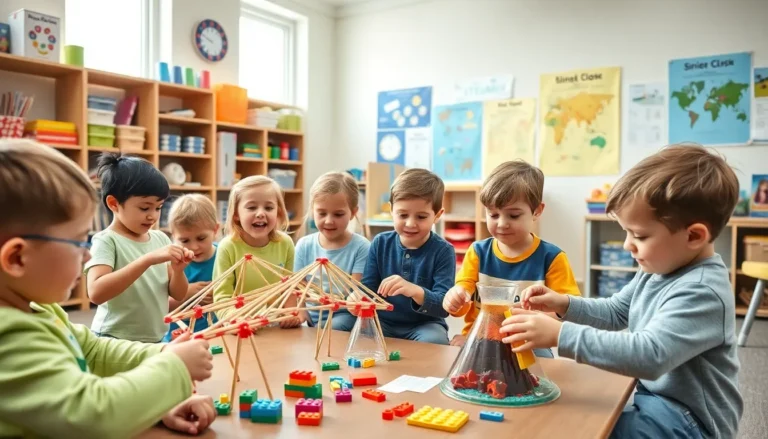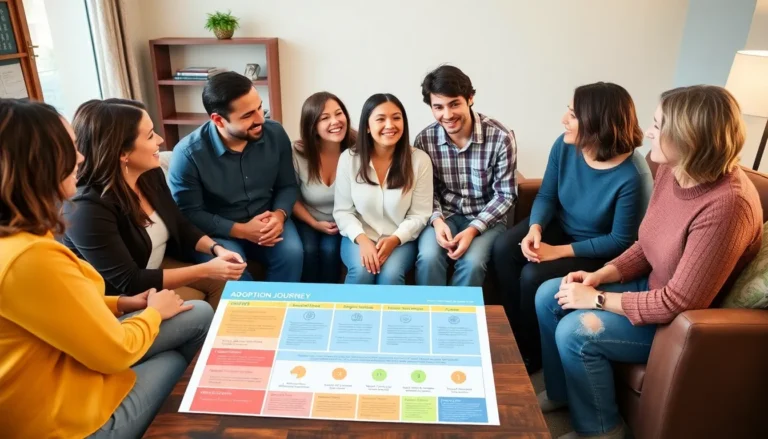Table of Contents
ToggleIn a world where kids are glued to screens, introducing STEM to preschoolers might feel like trying to teach a cat to swim. But fear not! It’s not just possible; it’s downright essential. Engaging young minds in science, technology, engineering, and math can spark curiosity and creativity faster than you can say “rocket science!”
What Is STEM for Preschoolers?
STEM for preschoolers encompasses science, technology, engineering, and math education tailored for early childhood development. Introducing these concepts cultivates children’s abilities to explore, investigate, and question their surroundings. Engaging preschoolers in STEM activities encourages creative thinking and problem-solving skills.
Science involves hands-on experiments that spark curiosity. Activities such as planting seeds, observing insects, or mixing colors provide tangible experiences. Exploration allows children to make connections and discover cause-and-effect relationships.
Technology includes basic digital skills and the use of simple tools. Exposure to technology starts with interactive games, coding apps, or even programmable toys. Familiarity with these tools lays the foundation for future learning.
Engineering fosters design and construction skills. Building with blocks or construction sets enhances spatial awareness. Children learn to work collaboratively to solve challenges, reinforcing teamwork.
Math introduces essential concepts through everyday activities. Counting objects, measuring ingredients, and identifying shapes turn math into play. These experiences build numerical fluency and analytical thinking.
Integrating STEM into preschool activities offers long-term benefits. Children develop a love for learning while acquiring important skills. Engaging lessons lay the groundwork for future academic success and a lifelong interest in these fields.
The Importance of STEM Education
Introducing STEM education to preschoolers fosters early engagement with critical concepts. This approach nurtures a child’s innate curiosity and desire to explore the world around them.
Encouraging Curiosity and Exploration
STEM programs spark a sense of wonder in children. Hands-on experiments invite preschoolers to ask questions. They become active participants in their learning, discovering new ideas through play. Activities such as planting seeds or building with blocks promote exploration of scientific principles. These experiences cultivate a mindset that values innovation. Children learn to observe, hypothesize, and test their ideas. Encouraging this natural curiosity lays the foundation for advanced learning in later years.
Building Essential Skills
STEM education enhances vital skills essential for future academic success. Engaging with math and science helps preschoolers develop problem-solving abilities. They learn to think critically while tackling challenges. Engineering activities introduce concepts of design and construction, encouraging creativity. Technology integration familiarizes children with basic digital skills. These foundational competencies support lifelong learning in rapidly changing environments. Coordinating various activities helps enhance motor skills, promoting physical development alongside cognitive growth. Prioritizing these experiences equips young learners with tools for their future.
Effective STEM Activities for Preschoolers
Engaging preschoolers in STEM activities fosters curiosity and supports early development. These activities encourage exploration and enhance foundational skills.
Hands-On Experiments
Hands-on experiments spark interest in scientific principles. Children can explore nature by observing plant growth or conducting simple physics experiments, such as building ramps for toy cars. These activities develop critical thinking and problem-solving skills. Mixing baking soda and vinegar introduces chemical reactions in a playful manner. Parents and educators can encourage exploration by providing materials like magnifying glasses, measuring cups, and recycled items. Experimenting with water, sand, or mud promotes sensory experiences while teaching basic scientific concepts. Visual and tactile interactions strengthen learning, making science enjoyable and accessible for young minds.
Integrating Technology
Integrating technology enhances children’s understanding of the digital world. Introducing age-appropriate apps supports early math and coding skills through engaging games. Interactive storytelling apps foster creativity and promote language development. Simple robotics kits designed for preschoolers teach essential concepts of engineering and programming. Additionally, using tablets to document experiments promotes reflection and observation skills. Adults can facilitate group projects using technology, encouraging teamwork and collaboration. Online videos can broaden knowledge by presenting real-world applications of STEM. These tools nurture curiosity while ensuring that children use technology positively and effectively, preparing them for an increasingly digital future.
Tips for Parents and Educators
Creating a supportive learning environment fosters curiosity for STEM in preschoolers. A STEM-friendly space includes accessible materials that encourage exploration, such as building blocks, science kits, or art supplies. Designate areas where children can engage in hands-on activities, encouraging them to manipulate and learn through play. Display books and visuals related to science, technology, engineering, and math to inspire ongoing interest.
Encouraging open-ended questions stimulates critical thinking in young learners. Prompt children with questions like “What do you think will happen if we mix these two colors?” or “How can we build a stronger tower?” Engaging them in discussions invites diverse responses and nurtures creativity. Allowing children to explore answers together fosters a collaborative atmosphere for learning. Using everyday situations as a platform for questions enhances their understanding of STEM concepts while promoting a rich dialogue.
Conclusion
Embracing STEM education for preschoolers paves the way for a bright future. By engaging young minds in exploration and hands-on activities, parents and educators can ignite a passion for learning that lasts a lifetime. These early experiences not only foster curiosity but also develop essential skills like problem-solving and critical thinking.
Creating a supportive environment filled with accessible resources encourages children to ask questions and seek answers. As they interact with the world around them through STEM, they build a strong foundation for academic success. Prioritizing these experiences ensures that preschoolers are well-equipped to thrive in an increasingly complex and technology-driven society.






